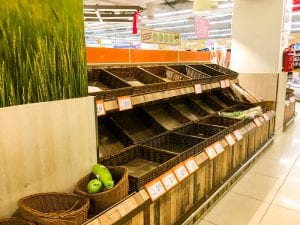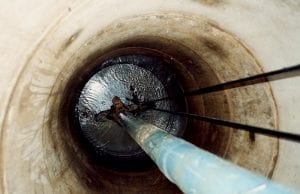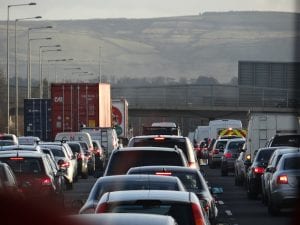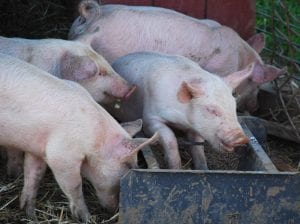It’s been a few years since the World Health Organization declared COVID-19 a global pandemic back in 2020. While the initial shock has passed, the impact of those early days still echoes in how we think about health, community, and… shopping.
As you’ll recall, many of us found new ways to show up for one another, doing our part to protect the most vulnerable and adapt to a rapidly changing world.
And yet, if you think back to those first chaotic grocery runs, you’ll remember that self-interest was also on full display.
The Tragedy of the Commons in Grocery Stores
As the seriousness of COVID-19 settled in, people rushed to panic buy all sorts of essentials and nonessentials (oatmilk sales skyrocketed!). Stores quickly ran out of hand sanitizer, isopropyl alcohol, and disinfectant wipes. And as schools shut down, food started disappearing as well: eggs, milk, bread, frozen veggies, you name it. Shoppers even came to blows over disappearing supplies of toilet paper. In an attempt to ensure their own comfort and safety, individuals quickly depleted limited supplies of resources.
This chaos brings to mind a concept that is all too familiar in the world of environmentalism: the tragedy of the commons.

What is the Tragedy of the Commons?
The phrase “tragedy of the commons” is credited to ecologist Garret Hardin, who in a 1968 paper described how shared resources (“commons”) are inevitably destroyed. Individuals use up the resources in a rational but selfish manner, causing long-term disastrous consequences for everyone. Hardin’s initial characterization of this concept was inaccurate. He was profoundly racist, and many of the ideas specific to his paper have been justly criticized and disproven. Economist Elinor Ostrom, for instance, won the Nobel Prize in Economics for her work on sustainable, cooperative governance of shared resources. Her work showed that while depletion of shared resources sometimes occurs, it is not inevitable.
In environmental science, it is important to recognize situations where the tragedy of the commons can occur, because sustainable management of shared resources can remedy these occurrences of “tragedy” and create healthy interactions between humans and their environment.
So how does the tragedy of the commons play out in real life? Let’s look at a few examples.

Groundwater Systems Fall Victim to the Tragedy of the Commons
Groundwater is a prime example of a resource that is subject to depletion if not effectively managed. In the United States, the agriculture industry uses 50 billion gallons of groundwater every day. Additionally, groundwater is the source of drinking water for half of the country’s population. When individuals pump too much groundwater, the resource is depleted before it can be replenished, and the consequences are significant.
Individual overuse of groundwater reduces the amount and quality of the water supply, helping create a problem that impacts everyone. As the water table lowers, wells are unable to reach their water sources, and the lakes, rivers and streams that are connected to the groundwater have less supply to pull from. Additionally, more energy and money are required for pumping groundwater to the surface. And along coasts, excessive pumping ruins water quality by allowing salt water to contaminate the supply.
In order to sustain this shared resource, individual actors have to communicate and collaborate rather than acting purely out of self-interest. The journey towards sustainable groundwater management in southern California speaks to the magnitude of such an issue and the hard work required in ensuring that valuable resources are not destroyed.

The Impact on Global Traffic Congestion
In cities all across the globe, traffic jams are an unfortunate part of daily life. Congestion has increased over the last decade, with the most congested cities spread throughout countries like India, Colombia, the Philippines, Russia and Turkey.
Traffic jams begin with each individual choosing to use public roads in order to best serve their own transportation needs. However, in densely populated urban areas, vast numbers of individuals make this choice at the same time, and naturally, problems arise.
As congestion develops, cars sit idly by. Bumper to bumper traffic destroys the function of the shared resource as an efficient pathway for daily transportation. And more importantly, individual cars deposit fumes that harm the atmosphere, contributing to large-scale societal problems. In order to minimize environmental harm and preserve the function of shared public roads, individuals cannot operate purely out of self-interest.

Marine Plastic Pollution
Plastic pollution is another illustration of the tragedy of the commons playing out in real time. Plastic products are widely available and are both comfortable and convenient for consumers. However, as society continues to accumulate and mismanage plastic waste, marine ecosystems are increasingly subject to extensive damage.
Challenges surrounding the existence of the great pacific garbage patch show exactly how the environment can suffer when self-interest alone guides decision-making. Individuals acting without consideration for societal consequences collectively contribute to this massive garbage gyre in international waters. Because everyone holds some responsibility for creating the problem, efforts to reduce the damage require collaboration on a global level.

The Overuse of Antibiotics and the Rise of Superbugs
Overuse of antibiotics poses a major threat to global health. When antibiotics are used unnecessarily, they become less effective, kill off good bacteria, weaken the immune system, and lead to the development of drug-resistant bacteria. These drug-resistant superbugs have enormous potential for harm, with the death toll from antimicrobial infections expected to reach 10 million in 2050.
Various individual actors contribute to the overuse of this common resource. In the medical field, antibiotics are overprescribed. Many patients request antibiotics just in case they have a bacterial infection, rather than waiting to see if the treatment is appropriate. And doctors sometimes prescribe antibiotics to avoid getting hit with malpractice suits.
Antibiotic overuse also has huge ties to farming. In the United States, 70 percent of antibiotics are used for agriculture. Instead of reserving antibiotics for treatment of sick animals, farmers use the drugs to promote growth in livestock and to prevent infections that occur in unsanitary living conditions. These decisions improve farmers’ individual opportunity for profit to the detriment of society as a whole.
How to Avoid the Tragedy of the Commons
In all these examples of the tragedy of the commons, collaborative effort is key to sustainable management of common resources. Balancing concern for the well-being and interests of individuals with concern for the well-being of the group and of the shared environment can create healthier long-term outcomes for everyone.
*This article was originally published on March 26, 2020 and updated on July 10, 2025.
Image Credits: Coronavirus Panic shopping, Ntuc super store, Singapore by cattan2011 is licensed under CC BY 2.0; Shallow well, Thailand by Water Alternatives is licensed under CC BY 2.0; Traffic Jam by lorenz.markus97 is licensed under CC BY 2.0; Marine litter. A colourful reminder of a huge environmental problem. by Bo Eide is licensed under CC BY-NC-ND 2.0; Pig-palooza by Adam Fagen is licensed under CC BY-NC-SA 2.0




